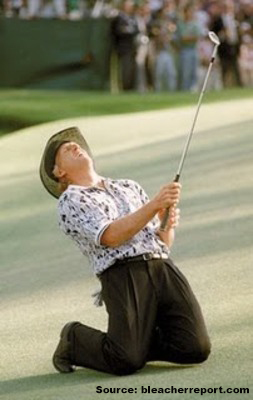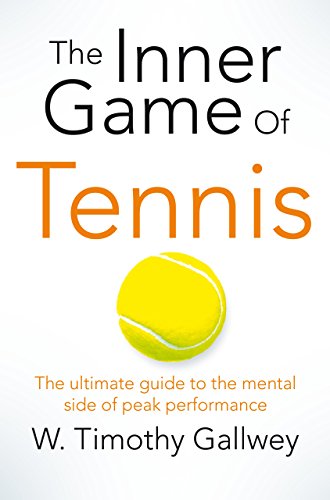‘The yips’ is a phrase first coined in the world of golf but has a now become a cross over term to many sporting disciplines. The best definition of the yips that I have found is “a state of extreme nervousness that causes a golfer to miss an easy putt.”
 This was very evident in the 1996 Masters where legendary golfer Greg Normal blew a 6-shot lead going into the last day. This ESPN article attempts to explore what happened on that day. Two key paragraphs from the article that stands out:
This was very evident in the 1996 Masters where legendary golfer Greg Normal blew a 6-shot lead going into the last day. This ESPN article attempts to explore what happened on that day. Two key paragraphs from the article that stands out:
Experts say the chain of events when someone “chokes” typically goes something like this: When people get anxious about performing, they begin scrutinizing actions that are best performed automatically. This heightened self-consciousness under pressure can contribute to a domino-like chain of psychological and physiological reactions that might cause them to underperform, even when their talent or finely honed skills suggest the outcome should be otherwise.
“An important thing to understand is choking is mental, emotional and physical — it’s all of that,” says Lindsay Hyman, a sports physiologist who works with athletes at the U.S. Olympic training centre. “The tipping point is different for each individual.”
Linking this to squash, I am sure we have all experienced the match when we are 10-8 up in the fifth game of a tight and important match that we really want to win and we cannot for the life of us now even hit a simple shot such as a straight drive, or we tin an easy shot in the middle going for a drop, or even worse (as it happened to me once) hit a volley that hits the bottom frame of your racket and hits your shoe! You end up losing this match and feel distraught that all your motor skills you were performing effortlessly earlier on in the match have now just disappeared on you. What can be catastrophic is now taking this feeling into your next few performances and having a real major slump over the course of several matches. This blog will attempt to give you a coping strategy if this situation of being 10-8 should arise in one of your next matches.
Tversky and Kahneman came up with the prospect theory which states:
Prospect theory assumes that losses and gains are valued differently, and thus individuals make decisions based on perceived gains instead of perceived losses. Also known as the “loss-aversion” theory, the general concept is that if two choices are put before an individual, both equal, with one presented in terms of potential gains and the other in terms of possible losses, the former option will be chosen.
I have been lucky enough to work closely with a South African friend of mine who is a top-level sports scientist and who has worked with the best athletes in different sporting contexts around the world. He has worked with multiple Premier League footballers, Indian cricket players, professional golfers and more recently professional squash players. A lot of what is proposed below is from his findings and discussions together with myself.
In simple terms, people don’t like to lose what they already have. Being 10-8 match ball up feels like you ‘already have’ the match in the bag and are the favourite to now win. A psychological trait occurs in that we now lower our levels of risk and play with less freedom as it feels like we have more to lose. This psychological trait is called risk aversion. Given that generally, we play better when we are feeling free, how do we solve this problem? How do we avoid feeling free one moment and then tense the next depending on how the game is going?
There are 2 solutions:
- Separate your tactical and emotional thinking. What shot you should choose to play should be based on a tactical choice, not an emotional choice. Once you have made this tactical choice, you should commit to it regardless of your emotional state. Think of certain players in your club or on the world tour, or in other sporting disciplines that are like ice in high stakes situations. Roger Federer comes to mind immediately, he is able to make great tactical choices and plays with freedom when the pressure is sometimes at its highest.
- Do away with the concept of probability. Forget the whole 50:50, 60:40, 90:10 business, forget being the big underdog, the slight undergo, the big favourite. It means nothing. The favourite does not own the trophy before the match begins. No matter the score during the match (i.e. 10-8 match ball up), you own 0% of the trophy before the game ends and because you do not own the trophy you have nothing to lose because you can’t lose what you don’t have. YOU CAN’T LOSE WHAT YOU DON’T HAVE! When you are able to understand this you will not become fearful and risk-averse as the favourite and you will be able to play with freedom.
In sport your chance of winning is tactically relevant, it is not emotionally relevant. This is where squash players can get the yips when they see the finish line being 10-8 up in the fifth and feeling that they are now the favourite and that they actually have the win. Learning to separate the tactical and emotional thinking will be a major asset and skill to take forward into these future situations. Whether you chose to play an attacking or defending shot that is tactically correct, execute with freedom.
 One key bit of reading that I would suggest to any squash player is the booked called The Inner Game of Tennis by Timothy Gallwey. Most top players I have spoken to over the years reference this book as a key and pivotal book in their careers once they had read it. The book investigates the idea of being mindful and present without attaching judgment to shots. This links closely to the idea of removing emotional thinking and to play with freedom in the moment. No one I have spoken to about this book thinks it is not useful and really impactful and I would go as far to say that each squash player should have a copy in their squash bag at all times to reference and flick through as constant reminders of attempting to avoid the yips.
One key bit of reading that I would suggest to any squash player is the booked called The Inner Game of Tennis by Timothy Gallwey. Most top players I have spoken to over the years reference this book as a key and pivotal book in their careers once they had read it. The book investigates the idea of being mindful and present without attaching judgment to shots. This links closely to the idea of removing emotional thinking and to play with freedom in the moment. No one I have spoken to about this book thinks it is not useful and really impactful and I would go as far to say that each squash player should have a copy in their squash bag at all times to reference and flick through as constant reminders of attempting to avoid the yips.
Jesse Engelbrecht
Want to improve your mental toughness?
Check out this great series where Paul Assaiante explains everything you need to know to improve your mental toughness during matches.
Watch now